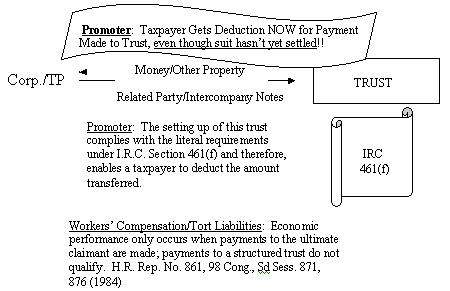LISTED TRANSACTIONS
Listed Transaction #24
(”CLAS”)
Contested Liability Acceleration Strategies
IRS Notice 2003-77

According to a June 28, 2004 Wall Street Journal article, this is a particular strategy that was sold by KPMG, LLP to a number of SEC companies. In the transaction, a “contested liability trust” is formed and funded by the taxpayer company (e.g., the writing of an IOU to a subsidiary of the taxpayer, and then transferring the note to the trust). In filings with the SEC, the company states that the assets in the trust are “not legally restricted” suggesting that the taxpayer company can exercise control over them. While the federal tax law generally prohibits the taking of deductions with respect to the payment of lawsuits (i.e., to settle the suit), KPMG purportedly relied on an exception found in Section 461(f) of the Internal Revenue Code (i.e., perceived loophole). Quite often, noncash assets transferred to the trust were comprised of “intercompany notes” between different arms of the same parent company (called related party notes), equal in amount to the amount that were expected to be paid down the road to resolve the claims.
Companies reported by the June 16, 2004 Wall Street Journal to have executed agreements with KPMG to pursue a CLAS include Qwest Communications International, Inc., Washington Mutual Inc., Global Crossing Ltd., Lennar Corp., the US units of Cemex SA and Siemens AG. Furthermore, Delta Air Lines Inc., Whirlpool Corp., Clear Channel Communications Inc., WorldCom Inc., Tenet Healthcare Corp., and the US units of AstraZeneca PLC and Fresenius Medical Care AG are said to have actually used the shelter, according to the companies and KPMG records reviewed by the Wall Street Journal. As reported, KPMG’s marketing materials are said to have included talking points for salespeople, pointing out that “the true beauty is what is not required-cash!.” In response to suggestions from potential buyers that “it’s too good to be true,” the salespeople are reported to have been advised to respond by telling potential buyers that KPMG was actually involved in drafting the regulations and “are acutely aware of the opportunity.” The Wall Street Journal further reports that the KPMG partner in charge of developing and marketing this particular tax shelter was a former IRS official, Carol Conjura. The Wall Street Journal reports that this shelter enabled 29 of these large companies to shave $1.7 billion off of their tax liabilities. Wall Street Journal, “KPMG Shelter Shaved $1.7 Billion Off Taxes of 29 Large Companies,” June 16, 2004.
If you believe that you may have engaged in a transaction that is the same or substantially similar to the transaction described above, Federal law may require you to disclose your and other parties’ participation in any such “listed transaction” on IRS Form 8886. For more information about Federal law requirements, please contact us.
